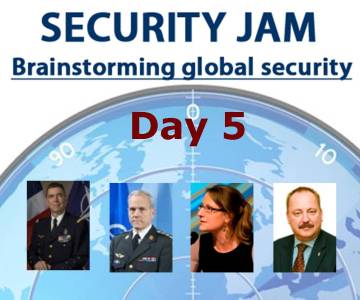
We have entered the fifth and last day of the Security Jam (organized by the Security and Defense Agenda), with log-ins from over 110 countries. Day 5 of the Jam will be focusing on concrete recommendations so make sure to log in and make your voice heard before the Jam closes today at 17:00 CET! Here is a recap of the most important points discussed on Days 3 and 4 thus far.
In the discussion forums, a controversial proposal has surfaced for a partition strategy in Afghanistan, similar to that proposed by Vice President Biden for Iraq. Can this be accepted by the international community, and does the NATO Alliance still have time to implement such a radically different plan? Jammers say that Afghanistan must be integrated into a regional body such as the Shanghai Cooperation Organisation (SCO) to protect the country from ill-intentioned neighbors. Teaching Afghan National Security Force (ANSF) personnel to read and write, and fighting illiteracy throughout the country to minimize Taliban influence is also high on the list of suggestions. Jammers are also reaching consensus that alliance security interests are fundamentally different from those of Afghanistan, begging the question of how these may be reconciled to ensure peaceful transition. The civilian and military actors that cooperate in Afghanistan have fundamental differences in setup and hierarchy – but could these differences be complementary rather than divisive?
The prospect of ‘geo-weaponeering’ is being presented as the transnational threat of the future, whereby terrorists could use natural disasters to create a complex terror attack – for example, through the launch of a cyber-attack following an earthquake. Jammers are also suggesting that the necessary weapons to combat transnational threats exist, but that they must now be used efficiently. The practical implications of this suggestion remain to be seen.
International cooperation on capability development could occur through national specialization, but one participant worries that countries might grab the opportunity to simply cut defense spending. One might wonder however whether this won’t happen anyway, if the financial crisis continues as it has thus far. Jammers have proposed a common maritime surveillance agency for European exclusive economic zones, to work with both NATO and the EU, citing Frontex as the possible starting base for such a body.
In the strategic partnership forum, the interaction between NATO and the SCO is coming under scrutiny, and common training for NATO, NGO and IO staff was proposed, in order to improve cooperation during operations. Moreover, there is widespread agreement that NATO needs to engage China but jammers disagree on how and at what level.
On a number of other topics, jammers are still debating if cyber-space is a global commons, and disagreement continues on the distinction between cyber-warfare and cyber-security. On the crisis management forum it was proposed that the EU should purchase its own crisis-management equipment, but questions remain as to how this would work in practice, and of course how EU member states would react. Debate also rages as to whether the Libya operation can be deemed a success, and on whether the “in-and-out” model of operation is the way to go.
As the Security Jam comes to an end, stay tuned to the ISN Blog for a detailed presentation of the final top ten recommendations, as they will be presented to world leaders ahead of the G8 and NATO summits in May 2012!
For more information on the Security Jam, please visit our previous posts Security Jam 2012 – Be Part of the Solution! and Security Jam 2012: Halftime.
To follow the Security Jam updates through the Security Defense Agenda’s YouTube channel, please click here.
To sign up to the Security Jam please click here.

